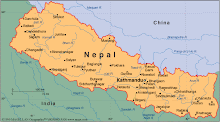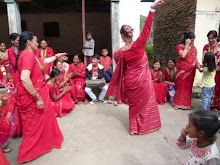
I’ve done a lot of thinking about gender issues in my lifetime. Through the lens of personal experience, academically while studying folklore and anthropology in graduate school, and through years of community work and programming, much of which has been with a focus on supporting young women, in particular.
I’m not sure I’ve thought and felt as intensely about gender, however, as I have in the last four months I have been in Nepal. Roles and expectations of women’s roles are quite well defined here, though in the bigger cities you can see a younger generation that is questioning these roles.
I imagine that for some people there is a lot of comfort and good in these defined roles. Nepal has less than a 3% divorce rate, family ties are extremely tight, and bonds between women are strong.
There are some bleak statistics and stories I’ve heard and witness here, as well, however. For instance, it assumed that about one third of women experience physical violence in their lives in Nepal. My coworker shared a statistic she found in the newspaper stating that 89% experience psychological/emotional violence.
The other day newspaper headlines included, “More Siraha Women Face Witchcraft Charges”, and “Cases Against ‘Cheating Wives’ On the Rise”. Seems that, even though prostitution is common enough that it is a serious problem in some cities, an indication that at least a good number of married men are not faithful to their wives, a woman who has an affair is something that can make the national newspaper. And in some regions in Nepal, women who have just given birth are put in the cowshed directly afterwards for over a week as they are considered unclean.
The story about witchcraft hit a particular nerve for me, as here – at least – it’s not really about witchcraft as magic or belief system, but rather about intense caste discrimination with witchcraft as the back drop. In this particular case, a woman from the lowest caste (dalit) was accused of killing her father-in-law who had been sick for a long time and died. She was dragged through the streets of the village, forced to eat feces, and has been totally excluded from the community. As we know, accusations of witchcraft, for at least hundreds of years (if not longer), has been used as a powerful tool to discriminate against women and to perpetuate violence and hatred.
Gender disparities in Nepal have also come into my life in a very personal way, as well. I am currently staying with a (wonderful) Nepali family who has taken me into their home until my apartment opens up in a couple of weeks. They have a helper in their home, a young girl who helps with the cleaning. In this context, taking a helper into their home is their way of taking care of girl who lives in poverty and offering her an education that she would not otherwise have.
When I returned from Kathmandu yesterday there was a new girl who had arrived. Her parents, however, won’t allow her to go to school, even though the family I stay with would pay for her schooling. She is 9 years old.
In this place of witnessing gender violence – in the many forms in which it comes – I was grateful to be able to celebrate International Women’s Day with thoughtful, conscious, committed Nepali individuals: youth, activists, government officials, lawyers. And other VSO volunteers.
I helped to lead and facilitate a 3 day workshop on Gender and Inclusion in the Workplace last week with a great team of folks, and it ended up being quite successful, despite the fact that much of it was planned last minute. Maybe there is something to be said for the creativity and flexibility and deadlines, though really, I know it was because of the stellar team we had putting it together. We incorporated song and dance, local leaders and activists, perspectives from 3rd gender participants, film, time for reflection, planning and networking. It was re-energizing for me to be around others who are actively participating in positive change. To be around all sorts of women and men really thinking about how to bring more equity into their personal lives, workplaces, and communities. Even more energizing to see just how large the group was.
My friend Jimmy, from Uganda, gave his female friends chocolate for Women’s Day. My friend, Donald, from the Phillipines threw a party for our volunteer group to celebrate Women’s Day. And my friend, Wanet, also from the Phillipines, found beautiful bookmarks that she gave to everyone in honor of Women’s Day. I’ve never done too much in my own past to celebrate International Women’s Day. I have a feeling that I will in the future, however.
I figure that the only weapon against violence and discrimination is awareness, love, education. And remembering and honoring what is sacred. In whatever way you can – with parties, chocolate, bookmarks, dance, and song…..and other kindred spirits. How wonderful to be surrounded by kindred spirits.



















